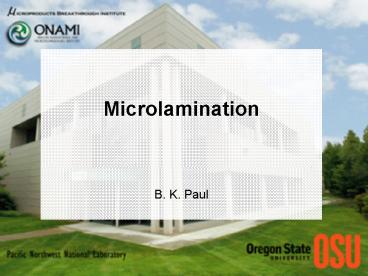Microlamination PowerPoint PPT Presentation
1 / 25
Title: Microlamination
1
Microlamination
- B. K. Paul
2
Outline
- How do we make microchannel arrays?
- Patterning
- Laser Machining
- Chemical Etching
- Diffusion Bonding
- Microlamination Economics
3
Microreactor Specifications
- Operate at lt 100 C and lt 1 atm
- Corrosive environment
- Explosive reaction
- Small volume of resin
- Minimize dead spots
- 316L Stainless Steel
- 200 µm diameter channels
- Flow rates demand millions of channels
- ? Number Up
4
Number Up Channels
200 µm wide channels in 316L SS
header
- Channels
- 200 µm wide 100 µm deep
- 300 µm pitch
- Lamina (24 long x 12 wide)
- 1000 µchannels/lamina
- 300 µm thickness
- Double-sided etch
channels
Chemically etched lamina
5
Number Up Layers
- Straight-through flow
- Counter-flow for HX
- (if necessary)
- Device (12 stack)
- 1000 laminae
- 1 x 106 reactor µchannels
6
Number Up Devices
Bank of Microchannel Reactors (9 x 106
microchannels)
Microlamination of Reactor
7
MECS Fabrication
- Precision typically achieved with Silicon
- MECS are larger than IC/MEMS/µTAS
- MECS are high-throughput fluidic devices
- Silicon is generally not the favored base
material - Cost
- Properties
Courtesy of DOE ARC
10 x 10 x 20 cm HX
Courtesy of DOE PNNL
100 µm high microchannels
5 µm pores
8
Microlamination Paul et al. 1999, Ehrfeld et
al. 2000
- Bonding
- diffusion bonding
- solder paste reflow
- ultrasonic welding
- Registration
- thermally-enhanced edge registration
- compliant registration
- thermal compliance
- Patterning
- machining (laser )
- micromolding
- forming (punching )
W. Ehrfeld, V. Hessel, H. Löwe, Microreactors
New Technology for Modern Chemistry, Wiley-VCH,
2000.
9
Microlamination Paul et al. 1999, Ehrfeld et
al. 2000
Microchannel Array
Copper
Cross-section of SS Array
Micrograph courtesy of PNNL
W. Ehrfeld, V. Hessel, H. Löwe, Microreactors
New Technology for Modern Chemistry, Wiley-VCH,
2000.
10
Microchannel Arrays
65 x 130 µm
100 µm
Cu
150 µm
Al2O3
100 x 100 µm
316L SS
Ti
11
Microlamination Challenges
- Identical dimensions across 1E6 channels
- Silicon is generally not the favored base
material - High aspect ratio features
- Susceptible to warpage
- Embedded geometry
- Distribution of flow between layers and channels
35 µm high microchannels
microchannel warpage
header design
12
Outline
- How do we make microchannel arrays?
- Patterning
- Chemical Etching
- Laser Machining
- Diffusion Bonding
- Microlamination Economics
13
Microlamination
14
Metal Patterning
- Through cut
- Laser Machining
- Wire Electrical Discharge Machining
- Sheet Metal Punching/Blanking
- Blind cut
- Micro Electrical Discharge Machining
- Photochemical Machining
- Sheet Metal Drawing
15
Laser Machining
UPE membrane
20 µm hole arrays
16
Wire EDM
17
microEDM
Spindle
Collet
- Tool wear is a key concern and makes this
technique difficult to produce more than one
lamina. - Better for adding features to tooling.
Tool
MicroEDM
18
Photochemical Machining
19
Sheet Metal FormingBlanking/Punching
20
Sheet Metal FormingDrawing
21
Outline
- How do we make microchannel arrays?
- Patterning
- Chemical Etching
- Laser Machining
- Diffusion Bonding
- Microlamination Economics
22
Photochemical Machining
23
Designers Perspective
24
Manufacturers Perspective
- Etch factor, E
- where
- U undercut
- d etch depth
- Anisotropy, A
- Mask width, Wm
- where
- Wf feature width
NOTE Etch factor in readings is not same.
25
Outline
- How do we make microchannel arrays?
- Patterning
- Chemical Etching
- Laser Machining
- Diffusion Bonding
- Microlamination Economics

